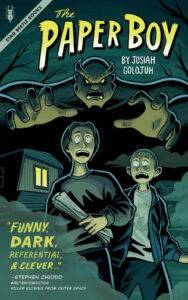From the Publisher: “It’s Pittsburgh, 1910—the golden age of steel in the land of opportunity. Eastern European immigrants Janos and Karina Kovac should be prospering, but their American dream is fading faster than the colors on the sun-drenched flag of their adopted country. Janos is exhausted from a decade of twelve-hour shifts, seven days per week, at the local mill. Karina, meanwhile, thinks she has found an escape from their run-down ethnic neighborhood in the modern home of a mill manager—until she discovers she is expected to perform the duties of both housekeeper and mistress. Though she resents her employer’s advances, they are more tolerable than being groped by drunks at the town’s boarding house.
When Janos witnesses a gruesome accident at his furnace on the same day Karina learns she will lose her job, the Kovac family begins to unravel. Janos learns there are people at the mill who pose a greater risk to his life than the work itself, while Karina—panicked by the thought of returning to work at the boarding house—becomes unhinged and wreaks a path of destruction so wide that her children are swept up in the storm. In the aftermath, Janos must rebuild his shattered family with the help of an unlikely ally.
Impeccably researched and deeply human, Beneath the Veil of Smoke and Ash delivers a timeless message about mental illness while paying tribute to the sacrifices America’s immigrant ancestors made.”More Info About the Author: A native of Western Pennsylvania, Tammy Pasterick grew up in a family of steelworkers, coal miners, and Eastern European immigrants. She began her career as an investigator with the National Labor Relations Board and later worked as a paralegal and German teacher. She holds degrees in labor and industrial relations from Penn State University and German language and literature from the University of Delaware. She currently lives on Maryland’s Eastern Shore with her husband, two children, and chocolate Labrador retriever.
Full Bio Don’t miss out: Tammy Pasterick will be signing copies of Beneath the Veil of Smoke and Ash at Riverstone Books (McCandless) on Saturday, November 13th!
Event Info
June 1910
 “Is Lukas going to die, Papa?”
“Is Lukas going to die, Papa?”
Janos swallowed hard as he forced himself not to look away from his daughter. Sofie’s eyes were red and swollen, her dress caked in the dried blood of her little brother. The horrors of the day had followed them home.
“The doctors have done all they can for him,” Janos said as he touched Sofie’s shoulder. “It’s in God’s hands now.”
“Will Mama come with us to the hospital tomorrow? Lukas will want her there when he wakes up.”
Another wave of nausea hit Janos as he wiped a bead of sweat from his temple. Where was Karina? Her son was barely clinging to life, and she was nowhere to be found. He wasn’t sure whether to be worried or angered by her absence. “Of course, zlatíčko,” he stammered. “I know she’d want to be at your brother’s side.”
Suddenly, Janos heard urgent footsteps climbing the steps to the back porch. As he sprang to his feet to open the door, his sister, Anna, burst into the room, her face ashen.
“The police are coming,” she said breathlessly. “There’s been a murder in the Heights. They’re looking for the woman who works for Henry Archer.”
Janos gasped. “A murder?”
“Was it Mr. Archer?” Sofie clutched her chest.
“I don’t know. The neighbors are speaking to the detectives now. I didn’t hang around long enough to get the details.” Anna scanned the room. “Has Karina come home yet?”
Janos shook his head. “Still haven’t seen her since last night.”
Anna’s eyes grew wide.
And then it struck him. Janos stumbled backwards onto the kitchen table, gripping its edge for support. Lukas hadn’t been confused. He was telling the truth.
“I’m going back down the street to see what I can find out,” Anna said as she rushed toward the door. “Maybe I can stall the police.”
“Sofie,” Janos whispered to his daughter. “Go up to bed and stay there.”
“Yes, Papa,” she replied, her lip quivering.
“And one more thing . . . don’t tell anyone what Lukas saw at the train station this morning.”
One Month Earlier
Chapter One
KARINA
RIVERTON, MAY 27, 1910
Karina Kovac heard the harsh caw of a crow passing overhead as she began her walk to work. She looked up at the early morning sky and frowned. The gray cloud of soot greeted her as it did every morning. No matter the time of day or season, the eerie mass hung, thick and heavy, casting its dismal shadow over her, darkening her mood.
She imagined the town along the river had once been beautiful—before industry and progress had blanketed the valley in a veil of smoke. But the Riverton she knew was ugly and depressing. The buildings were covered in a dingy layer of grime, and the air was an assault on her senses. It was only slightly less suffocating than that of Pittsburgh, which was ten miles downstream. The steel capital of the world was famous for its perpetually dark sky, which often necessitated the use of street lamps during the day. Karina’s neighbors, most of them newly arrived from Eastern Europe, were unbothered by the smoky haze smothering the region. To them, it signaled opportunity and the promise of a better future. Jobs and prosperity.
Karina hated that gloomy sky, cursing it daily. It followed her everywhere, mocking her and laughing at her lack of success. She had failed to acquire the comfortable lifestyle she’d envisioned when she left Austria-Hungary over a decade earlier, and that sky wouldn’t let her forget it.
Karina had known it would take time for her and Janos to build a new life, but she’d never expected it to take so long. Working as a housekeeper in the town’s wealthiest neighborhood gave her a glimpse of what she and her family had not yet achieved. Her current employer owned every modern convenience she craved. Electricity. Indoor plumbing. A spacious kitchen with the latest Garland gas cookstove and McCray refrigerator. All had been installed in the mill manager’s new Foursquare home.
Karina stood in awe before the door of that refrigerator every morning, marveling at how fresh the food stayed. Her family’s ancient ice chest smelled of souring milk and had to be scrubbed constantly with Old Dutch Cleanser.
As Karina endured her daily coughing fit near the steel mill’s towering smokestacks, she heard a sharp whistle coming from a worker in the rail yard. She rolled her eyes. Though her housekeeper’s uniform was boring and drab, she still managed to attract unwanted attention. Perhaps her elaborate hairstyle had caught the man’s eye. She’d spent a ridiculous amount of time fussing with her hair that morning in the hopes that the executives coming from US Steel’s Pittsburgh offices would take notice of her. While she was grateful for the position in Henry Archer’s home, she longed to work at one of the grand estates in Shadyside or Squirrel Hill. What a relief it would be to get lost among an entire staff of servants.
Karina sighed as she thought of the first weeks in her employer’s home. She had wandered dreamily through the rooms, fingering the fine linens and switching the lights off and on, for fun. She’d soaked in the bathtub and napped beneath an expensive, snowy white Marseilles quilt. She thought she’d found the perfect escape from her dreary neighborhood and her job at the boarding house, but little did she know, the luxury of working in that home would come with a price.
A gust of wind suddenly hit Karina from behind and interrupted her brooding. She patted the mound of curls at the back of her head to make sure her garnet hair comb was still in place. She froze when her fingertips failed to locate it. Her heart pounding, she scanned the unpaved street and then shook her dress, hoping the comb would fall out of one of its folds. Where could it be? Her mind began to race.
Karina turned and rushed back down the street toward the shabby rows of homes erected by the steel company. Her eyes darted in every direction, hoping to find the only valuable piece of jewelry she owned. When she arrived home breathless, she burst through the front door and began searching the sitting room.
“Karina? I thought you’d left for work,” Janos said, peeking through the kitchen doorway.
“My hair comb is missing. I got the whole way to the mill before I realized it was gone. I retraced my steps, but can’t find it anywhere.” Karina inspected the floor and every nearby surface, her eyes welling with tears. “It’s the only thing I own of value.”
“Was it the comb with the tiny garnets?” Janos touched her on the shoulder, his face full of concern.
“Do I have another worth fretting over?” Karina glared at her husband as she brushed his hand away and hurried toward the staircase. “Maybe it’s in the bedroom,” she murmured.
“Mama!” Sofie shouted. “Did you bother to look in your brown pocketbook? That’s the one you came home with yesterday.”
Startled, Karina paused at the foot of the stairs as her ten-year-old daughter stomped out of the kitchen. “Shouldn’t you be in bed, Sofie? The sun’s barely up.”
“Where’s the pocketbook?” Janos asked his wife.
“It’s on the bookcase,” Karina said, dabbing her wet eyes with the sleeve of her dress. “But I’m sure I put the comb in my hair this morning. I know I did.”
“You need to calm down,” Janos said coolly as he picked up the worn pocketbook and peered inside. It took him just seconds to pull out the tortoise shell comb adorned with garnets.
Karina grabbed the hair comb and dashed toward the front door. “How could I forget?” she groaned, turning the doorknob.
“Wait,” Janos said. “Don’t you have something to say to Sofie?”
Karina sighed as she looked at her daughter for the first time that morning. “Thank you, honey. You were very helpful.”
Sofie ran to her mother and hugged her. “Good luck today, Mama. I know those important men from Pittsburgh will be impressed with your cooking.”
“Let’s hope so.”
“Is that why you’re so agitated this morning?” Janos asked.
“I guess,” Karina said, smoothing Sofie’s unruly hair. “I want to make a good impression today. Meeting these executives could lead to something . . . maybe a better position.”
Janos raised an eyebrow.
“I need to go. I’m running late. And, Sofie, please do something with your hair before you leave for school. You can’t go out in public with that mess on your head.” Her poor daughter’s thick blonde hair often looked like a bird’s nest when she woke in the morning.
Sofie nodded politely, despite the wounded look on her face.
“Maybe we could all go to the Radovics’ tonight to listen to Mihal play the accordion,” Janos said as Karina stepped onto the front porch. “An evening with friends will help you relax after such a big day at work.”
“The new Sears Roebuck catalog is out. Maybe another time,” Karina said, trying to disguise her guilt. She knew her family was tired of her excuses, but she did not enjoy socializing with the neighbors. Besides, she really did want to see the latest spring fashions.
As Karina hurried down the street toward the mill, she tucked her hair comb into her pocketbook, figuring there was no way to place it perfectly on her head without a mirror. And she dared not risk losing it on the street. Poverty had made her desperate. Her neighbors, too. They all clung fiercely to the few valuable items they owned, because they couldn’t afford to replace them.
When Karina finally reached Riverton Heights, she inhaled the cool morning air. The neighborhood sat high on the hill above town and escaped much of the smoke in the valley below. Fresh air was her reward for her twenty-minute climb uphill. The streets were lined with new Craftsman and Foursquare homes as well as some older Victorians. Graceful oak trees shaded the streets, and the sweet scent of pansies permeated the air.
Karina’s stomach quivered as she stepped onto Henry Archer’s front porch and unlocked the mahogany door. If one of the Pittsburgh executives failed to take notice of her, she planned to ask Henry for a raise. She had been working very long hours since she’d accepted the position with him six months earlier and had only received a slight increase in pay when her duties were expanded in March. Karina was certain she had proven her worth many times over in recent weeks, especially since her new responsibilities had little to do with keeping a house.
She closed the front door behind her and made her way to the kitchen at the back of the house. The sun was now up, but there were no sounds from upstairs to indicate Henry had risen. Not wanting to wake him, she quietly gathered ingredients for a pot roast from the refrigerator and pantry. As Karina washed vegetables in the farmhouse sink, she heard footsteps in the hall. She turned around to find Henry standing in the doorway of the kitchen with a smirk on his face.
“There’s no need to make lunch today,” he announced. “I got a call from Pittsburgh last night. The meeting has been cancelled.”
Karina gasped. “But I thought those men were coming to discuss your promotion.”
She tried to her hide her disappointment as she studied the face of her employer. She had never found him attractive. The college-educated bachelor was several inches shorter than her husband and lacked the brawn she was accustomed to seeing in the men around her neighborhood. He wore a permanent frown on his face, and his thin, charcoal-colored hair was receding. But today, he looked surprisingly pleasant, grinning like a school boy. How could he not be disappointed by their change in fortune?
“They were, but I’m no longer being considered for the position here in Riverton. I’m being transferred to headquarters in New York City.” Henry clapped his hands with excitement. “I’m going home.”
Paralyzed by the news, Karina stood motionless, trying to control the panic welling inside her. She leaned back against the porcelain sink for support, suddenly unable to breathe, her chest tightening.
Still grinning, Henry crossed the kitchen in three long strides. He grabbed Karina’s left breast and shoved his tongue into her mouth. His free hand moved greedily down the front of her dress. Even after three months of enduring his touch, Karina still had to remind herself not to recoil. But this morning, she was completely unaffected by Henry’s groping. Her singular focus was her uncertain future.
She gently pulled away from his eager kisses and took a deep breath. “When do you leave?”
“Not until the end of June. I need to train my replacement and tie up some loose ends at the mill. But I need you to start packing right away.”
Suddenly, memories of a run-down boarding house full of drunks flooded Karina’s mind. She flinched as a filthy immigrant squeezed her buttocks, the stench of his sweaty, unwashed body burning her nose. Shouts for more moonshine drowned out an old man’s complaint that the tripe was too chewy. A newcomer griped that someone had taken prostitutes into his room and soiled his mattress. He demanded that Karina clean the mess immediately. She groaned as she tried to shake the chaos from her head. I can’t go back.
A slight pinch transported Karina back to Henry’s kitchen. His teeth were on her earlobe.
“Shall we go into the bedroom to celebrate?” he whispered.
This excerpt from Beneath the Veil of Smoke and Ash is published here courtesy of the author and should not be reproduced without permission.


























